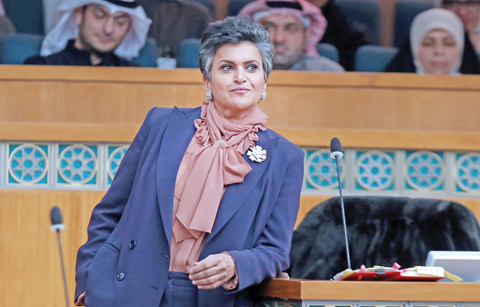 File Photo of MP Safaa Al-Hashem is seen during a session of the National Assembly. — Photo by Yasser Al-Zayyat
File Photo of MP Safaa Al-Hashem is seen during a session of the National Assembly. — Photo by Yasser Al-ZayyatKUWAIT: MP Safa Al-Hashem yesterday continued targeting expatriates in Kuwait with hostile proposals by calling on authorities to stop giving medicines at public clinics and hospitals to foreign patients.
Hashem, the only woman in the 50-member national assembly, said in the latest proposal that the KD 1 and KD 2 fees expatriates pay at clinics and hospitals, respectively, should be considered as a doctor's fee without including drugs.
Under the current system, the fee expatriates patients pay entitles them to see the doctor, receive medication and conduct almost totally free laboratory tests. In her proposal, Hashem called for making the drugs at clinics and public hospitals exclusively for Kuwaiti patients and that expatriates should buy their medicines from private pharmacies and drug stores.
She said her proposal would save large quantities of drugs which account for a huge budget from the government. It would also resolve crowding at public clinics and hospitals and also benefit the private medical sector.
Expatriates pay a mandatory annual health insurance fee of KD 50 per person per year. Payment of this fee is a precondition to obtain or renew the residence permit. In addition, expatriates pay charges for a long list of medical services especially x-ray and radiology services, surgeries, sleeping at hospitals and for some laboratory tests and examinations. They are also often not allowed more than basic medicines and many higher cost medicines are already restricted, in practice, to nationals only.
The health ministry has said it plans to raise the charges of medical services for expatriates very soon.
Hashem has been targeting expatriates with hostile proposals since she was elected to the new national assembly last November. Some rights activists and writers described her anti-expatriate proposals as "racist".
Several weeks ago, she called for imposing taxes and high charges on expatriates and "make them pay for walking on roads". She later called for banning expatriates from using intensive care units at public hospitals saying that "they consume the oxygen at the units". Hashem had previously called for sharply reducing the number of expatriates to be equal to Kuwaitis within five years.
At present, there are 3.1 million expatriates against 1.35 million Kuwaiti citizens. The government had said that it is impossible to reduce the number of expatriates to this level.
Social Affairs and Labor Minister Hind Al-Sabeeh said last month that the strategy of the ministerial demographic committee calls to reduce the number of expatriates at a much slower pace to become 60 percent of the population by 2030, down from the current 70 percent.
By A Staff Reporter











